-
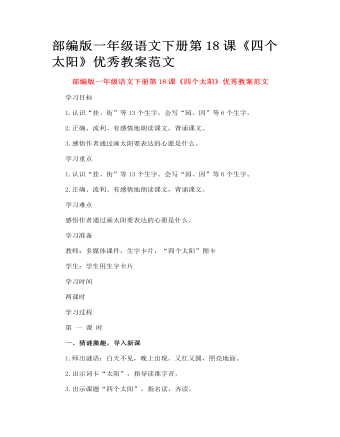
部编版一年级语文下册第18课《四个太阳》优秀教案范文
猜谜激趣,导入新课 1.师出谜语:白天不见,晚上出现。又红又圆,照亮地面。 2.出示词卡“太阳”,指导读准字音。 3.出示课题“四个太阳”,指名读,齐读。 4.引导质疑:读了课题,你的小脑瓜里是不是蹦出了小问号? 二、初读课文,认记生字 1.出示课件:带拼音生字,指名带读。 2.出示课件:去拼音生字并打乱顺序,摆字卡,自由练习朗读。 3.游戏:我说你找喊名字。 4.指导识记生字方法。 5.巩固游戏:我把生字送回家。动画演示,指导写字 1.猜谜引入:大口框里有个“大” 2.出示课件:“因”书写笔顺规则 看了动画,你知道了什么? 3.出示课件:“园” “园”与“因”哪里长得很像?书写的时候要注意些什么?(同样先里面后封口) 4.师范写“园”“因”,讲解书写要领。 5.生自由练写,师巡回指导。 6.集体评价。
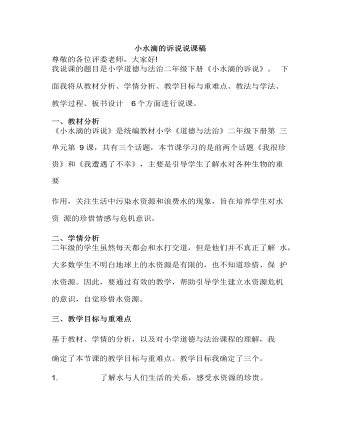
人教部编版道德与法制二年级下册小水滴的诉说说课稿
设计意图:发现生活中污染、浪费水资源的现象,明白可以靠 法律法规的作用,切实有效地保护水资源。活动三:我们和小水滴 课件出示儿歌《我们和小水滴》,学生先自己诵读,再齐读。 设计意图:学以致用,深入感受水资源的珍贵,自觉珍惜水资源。环节三:感悟明理,育情导行 学生谈一谈学习本节课的收获,教师相机引导。 设计意图:梳理总结,体验收获与成功的喜悦,内化提升学生的认识与情感。环节四:拓展延伸,回归生活 生活中,大家要自觉珍惜水资源。设计意图: 将课堂所学延伸到学生的日常生活中,有利于落实行 为实践。六、板书设计为了突出重点, 让学生整体上感知本节课的主要内容, 我将以思 维导图的形式设计板书: 在黑板中上方的中间位置是课题 《小水滴的 诉说》,下面左边是板画的小水滴, 右边从上到下依次是宝贵, 稀少, 珍惜。
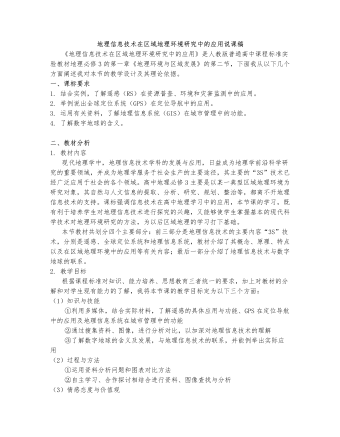
人教版高中地理必修3地理信息技术在区域地理环境研究中的应用说课稿
通过列表对比法、归纳法、、多媒体辅助法等教学方法,突破理论性强、不宜理解的“3S”原理与区别的知识难点。学生更是学会运用图表方法、高效记忆法、合作学习法等方法学习地理知识,增加学习能力。[幻灯片] “3S技术”的应用:地理信息技术的应用十分广泛,从实际身旁的社会生产生活,到地理学的区域地理环境研究。学生的年龄和认知范围决定,此部分的案例教学的运用,前者容易接触到、简单直观、易区分掌握“3S”技术特点和具体应用。而后者涉及地理学科的综合性和区域性的特点,难度较大。针对学情特点,我多以前者案例入手学习,以后者案例加以补充。案例:遥感:(1)视频 专家解说卫星遥感受灾影象(2)教材 图1.6 1998年8月28日洞庭湖及荆江地区卫星遥感图像(3)视频 2008年5月13日“北京一号”卫星提供汶川的灾区遥感图像(4)教材 阅读 遥感在农业方面的应用
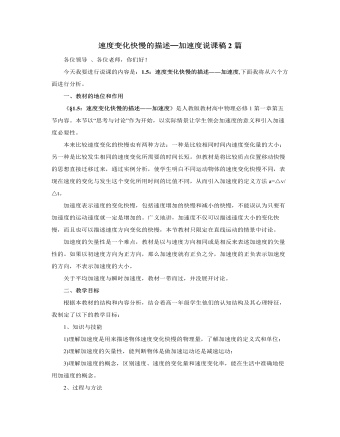
人教版新课标高中物理必修1速度变化快慢的描述─加速度说课稿2篇
本来比较速度变化的快慢也有两种方法:一种是比较相同时间内速度变化量的大小;另一种是比较发生相同的速度变化所需要的时间长短。但教材是将比较质点位置移动快慢的思想直接迁移过来,通过实例分析,使学生明白不同运动物体的速度变化快慢不同,表现在速度的变化与发生这个变化所用时间的比值不同,从而引入加速度的定义方法a=△v/△t。加速度表示速度的变化快慢,包括速度增加的快慢和减小的快慢,不能误认为只要有加速度的运动速度就一定是增加的。广义地讲,加速度不仅可以描述速度大小的变化快慢,而且也可以描述速度方向变化的快慢,本节教材只限定在直线运动的情景中讨论。加速度的矢量性是一个难点,教材是以与速度方向相同或是相反来表述加速度的矢量性的。如果以初速度方向为正方向,那么加速度就有正负之分,加速度的正负表示加速度的方向,不表示加速度的大小。
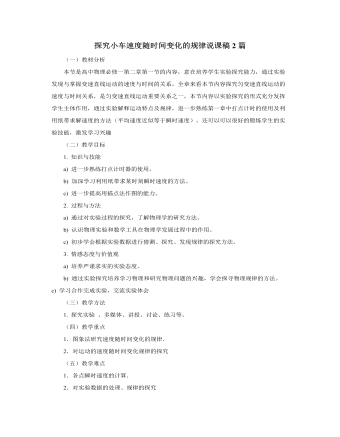
人教版新课标高中物理必修1探究小车速度随时间变化的规律说课稿2篇
(三)合作交流能力提升教师:刚才我们通过实验了解了小车的速度是怎样随时间变化的,但实验中有一定的误差,请同学们讨论并说出可能存在哪些误差,造成误差的原因是什么?(每个实验小组的同学之间进行热烈的讨论)学生:测量出现误差。因为点间距离太小,测量长度时容易产生误差。教师:如何减小这个误差呢?学生:如果测量较长的距离,误差应该小一些。教师:应该采取什么办法?学生:应该取几个点之间的距离作为一个测量长度。教师:好,这就是常用的取“计数点”的方法。我们应该在纸带上每隔几个计时点取作一个计数点,进行编号。分别标为:0、1、2、3……,测各计数点到“0”的距离。以减小测量误差。教师:还有补充吗?学生1:我在坐标系中描点画的图象只集中在坐标原定附近,两条图象没有明显的分开。学生2:描出的几个点不严格的分布在一条直线上,还能画直线吗?
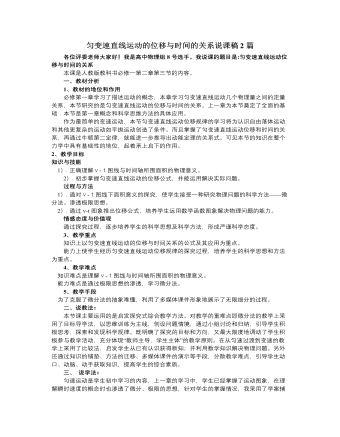
人教版新课标高中物理必修1匀变速直线运动的位移与时间的关系说课稿2篇
培养学生合作交流意识和探究问题的能力,这一部分知识层层递进,符合学生由特殊到一般、由简单到复杂的认知规律。4、互动探究(1)极限思想的渗透让学生阅读“思考与讨论”小版块.培养学生的自学和阅读能力提出下列问题,进行分组讨论:a、用课本上的方法估算位移,其结果比实际位移大还是小?为什么?b、为了提高估算的精确度,时间间隔小些好还是大些好?为什么?针对学生回答的多种可能性加以评价和进一步指导。让学生从讨论的结果中归纳得出:△t越小,对位移的估算就越精确。渗透极限的思想。通过小组内分工合作,讨论交流,培养学生交流合作的精神,以及搜集信息、处理信息的能力;通过小组间对比总结,使学生学会在对比中发现问题,在解决问题过程中提高个人能力;
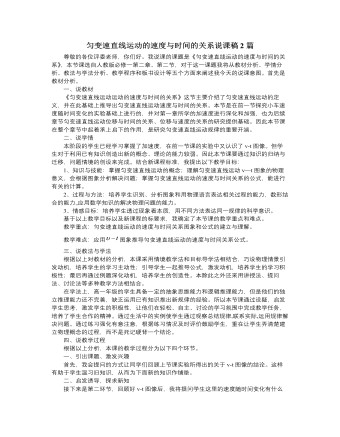
人教版新课标高中物理必修1匀变速直线运动的速度与时间的关系说课稿2篇
设计意图:几道例题及练习题,其中例1小车由静止启动开始行驶,以加速度 做匀加速运动,求2s后的速度大小?进而变式到:小车遇到红灯刹车……,充分体现了“从生活到物理,从物理到社会”的物理教学理念;例题及练习题由浅入深、由易到难、各有侧重,体现新课标提出的让不同的学生在物理上得到不同发展的教学理念。这一环节总的设计意图是反馈教学,内化知识。(6) 小结归纳,拓展深化我的理解是,小结归纳不应该仅仅是知识的简单罗列,而应该是优化认知结构,完善知识体系的一种有效手段,为充分发挥学生的主题作用,从学习的知识、方法、体验是那个方面进行归纳,我设计了这么三个问题:① 通过本节课的学习,你学会了哪些知识;② 通过本节课的学习,你最大的体验是什么;③ 通过本节课的学习,你掌握了哪些学习物理的方法?
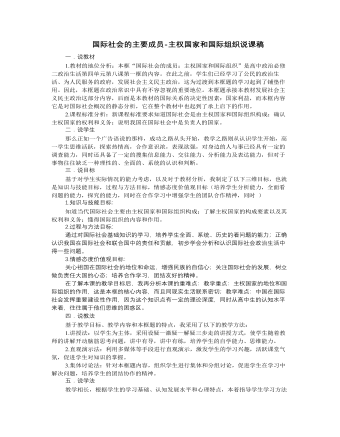
人教版高中政治必修2国际社会的主要成员-主权国家和国际组织说课稿
【教师总结:联合国的会徽的世界地图象征着联合国是一个世界性的国际组织;图案中得橄榄枝象征着和平。联合国采取了很多措施以实现它的宗旨,如对于朝鲜违反国际法规进行核试验,联合国给予警告和制裁,充分体现了它维护国际和平与安全,促进国际合作与发展的宗旨。】对于中国与联合国的关系这部分内容,我将请阅读教材92页几幅图片及材料内容,设置活动探究课中国在联合国的声音和身影,请合作讨论思考以下两个问题,中国与联合国的关系;列举事实说明中国在国际社会中的重要作用。 教师通过剖析中国在联合国的地位和作用,引导学生理解中国在国际社会中发挥着重要作用,是负责任的国家;同时培养学生综合运用知识分析说明问题的能力,使学生感受作为中国人的自豪。【教师总结:中国是联合国的创始国之一,中国作为联合国的创始国和安理会常任理事国之一,一贯遵循联合国宪章的宗旨和原则,积极参与联合国及其专门机构有利于世界和平和发展的活动。】
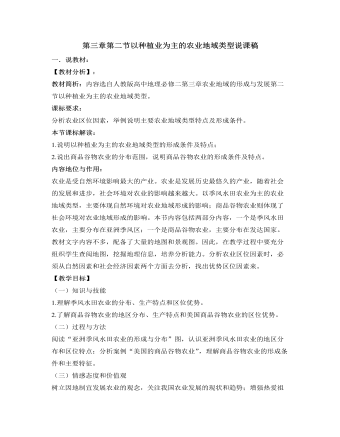
人教版高中地理必修2第三章第二节以种植业为主的农业地域类型说课稿
本节课标解读:1.说明以种植业为主的农业地域类型的形成条件及特点;2.说出商品谷物农业的分布范围,说明商品谷物农业的形成条件及特点。内容地位与作用:农业是受自然环境影响最大的产业。农业是发展历史最悠久的产业,随着社会的发展和进步,社会环境对农业的影响越来越大。以季风水田农业为主的农业地域类型,主要体现自然环境对农业地域形成的影响;商品谷物农业则体现了社会环境对农业地域形成的影响。本节内容包括两部分内容,一个是季风水田农业,主要分布在亚洲季风区;一个是商品谷物农业,主要分布在发达国家。教材文字内容不多,配备了大量的地图和景观图。因此,在教学过程中要充分组织学生查阅地图,挖掘地理信息,培养分析能力。分析农业区位因素时,必须从自然因素和社会经济因素两个方面去分析,找出优势区位因素来。
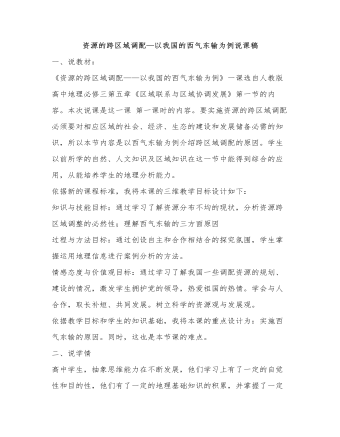
人教版高中地理必修3资源的跨区域调配—以我国的西气东输为例说课稿
由于这部分知识已要求学生在课前收集相关资料探讨分析,,现在提供机会让他们进行交流,充分发表各自的见解。所以,学生对这个知识掌握起来并不难。所以,我对这部分内容不做太多的讲解,只要做进一步的梳理,加深学生的理解即可。 第三是小结环节 在学生对西气东输工程的原因掌握之后进入的是小结环节,这里我进一步提出问题:在西气东输工程段的建设中有没有什么难关? 通过西气东输的难度了解,间接的表现我国的科技的发展,增加学生的爱国情,同时也说明西气东输的建成也有技术这一原因。从而也完成了本课时的小结。 第四环节是作业布置 在这里要求学生课后预习本课剩下的内容:思考西气东输对区域发展的影响以及为何要实施资源的跨区域调配。通过这样的问题一方面为下节课学习奠定基础,另一方面体现本课学习从“个”到“类”从特殊到一般的过程。
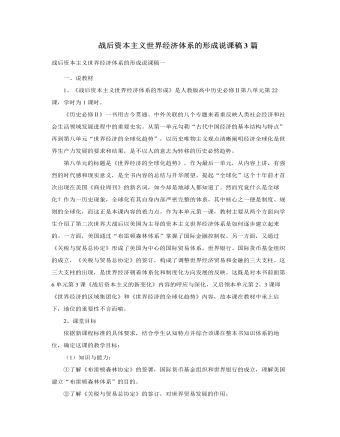
人教版高中历史必修2战后资本主义世界经济体系的形成说课稿3篇
1、《战后资本主义世界经济体系的形成》是人教版高中历史必修Ⅱ第八单元第22课,学时为1课时。《历史必修Ⅱ》一书用古今贯通、中外关联的八个专题来着重反映人类社会经济和社会生活领域发展进程中的重要史实。从第一单元勾勒“古代中国经济的基本结构与特点”再到第八单元“世界经济的全球化趋势”,以历史唯物主义观点清晰阐明经济全球化是世界生产力发展的要求和结果,是不以人的意志为转移的历史必然趋势。第八单元的标题是《世界经济的全球化趋势》,作为最后一单元,从内容上讲,有强烈的时代感和现实意义,是全书内容的总结与升华展望。提起“全球化”这个十年前才首次出现在美国《商业周刊》的新名词,如今却是地球人都知道了。然而究竟什么是全球化?作为一历史现象,全球化有其自身内部严密完整的体系,其中核心之一便是制度、规则的全球化,而这正是本课内容的着力点。
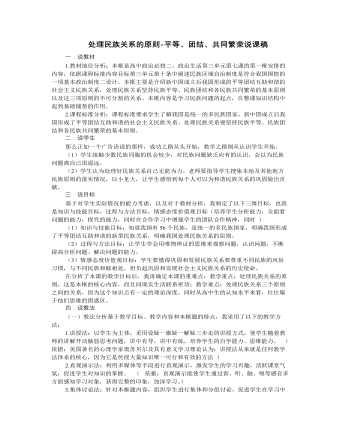
人教版高中政治必修2处理民族关系的原则-平等、团结、共同繁荣说课稿
环节四 情感升华,感悟生活播放《爱我中华》,感受祖国的伟大,民族的团结。设计意图:使学生感受伟大的中华民族的精神,内心产生共鸣,抒发强烈的爱国热情。教师带领学生一起合唱,用歌声结束本堂课内容,能再次唤起学生的爱国情感,使学生认识到:维护国家统一和民族团结是每个公民的义务。环节五 课堂小结 巩固知识本节课我采用线索性的板书,整个知识结构一目了然,为了充分发挥学生在课堂的主体地位,我将课堂小结交由学生完成,请学生根据课堂学习的内容,结合我的板书设计来进行小结,以此来帮助教师在第一时间掌握学生学习信息的反馈,同时培养学生归纳分析能力、概括能力。本节课,我根据建构主义理论,强调学生是学习的中心,学生是知识意义的主动建构者,是信息加工的主体,要强调学生在课堂中的参与性、以及探究性,不仅让他们懂得知识,更让他们相信知识,并且将知识融入到实践当中去,最终达到知、情、意、行的统一。
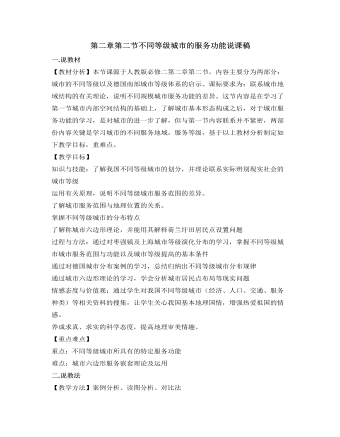
人教版高中地理必修2第二章第二节不同等级城市的服务功能说课稿
【教学目标】知识与技能:了解我国不同等级城市的划分,并理论联系实际辨别现实社会的城市等级运用有关原理,说明不同等级城市服务范围的差异。了解城市服务范围与地理位置的关系。掌握不同等级城市的分布特点了解称城市六边形理论,并能用其解释荷兰圩田居民点设置问题过程与方法:通过对枣强镇及上海城市等级演化分布的学习,掌握不同等级城市城市服务范围与功能以及城市等级提高的基本条件通过对德国城市分布案例的学习,总结归纳出不同等级城市分布规律通过城市六边形理论的学习,学会分析城市居民点布局等现实问题情感态度与价值观:通过学生对我国不同等级城市(经济、人口、交通、服务种类)等相关资料的搜集,让学生关心我国基本地理国情,增强热爱祖国的情感。养成求真、求实的科学态度,提高地理审美情趣。
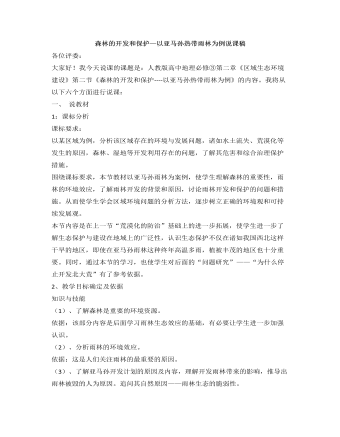
人教版高中地理必修3森林的开发和保护—以亚马孙热带雨林为例说课稿
【这部分的设计目的,要学生明白热带雨林只是一个案例,我们的目的是要合理开发和保护全世界的森林。由森林的开发与保护来明确区域发展过程中产生的环境问题,危害及治理保护措施。】然后知识迁移——东北林区的开发与保护介绍东北地区的森林材料:东北林区是我国最大的天然林区,主要分布于大、小兴安岭及长白山地,在平衡大气成分、净化空气、补给土壤有机质、涵养水源、保持水土、改善地方气候有重要的作用。它还是我国最大的采伐基地,宜林地区广,森林树种丰富。 东北林区开发中的问题及影响点拨:由于人类的严重超采,采育脱节,乱砍滥伐,毁林开荒,再加上森林火灾,东北林区的面积在锐减,带来了严重的生态恶化。我们该如何开发和保护东北地区的森林呢?
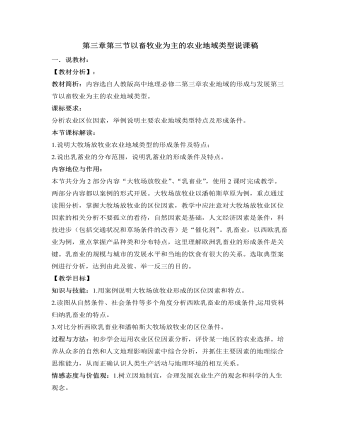
人教版高中地理必修2第三章第三节以畜牧业为主的农业地域类型说课稿
1.导入新课:通过视频“阿根廷的潘帕斯草原”,引起学生的兴趣,进而引出新的学习内容——以畜牧业为主的农业地域类型。2.新课讲授:第一课时,首先通过展示“世界大牧场放牧业分布图”,引出对大牧场放牧业的初步认识,了解其分布范围;然后通过展示“潘帕斯草原的地形图”“气候图”和“牧牛业景观图”,讨论分析大牧场放牧业形成的区位条件,并进行案例分析,学习该种农业的特点;最后,理论联系实际,展示:“中国地形图”“气候图”“人口图”“交通图”和“内蒙古牧区图”,分组讨论我国内蒙古地区能否采用潘帕斯草原大牧场放牧业的生产模式。第二课时,首先通过设问顺利从大牧场放牧业转入乳蓄业,通过讲述让学生了解乳蓄业的概念;然后通过展示世界乳畜业分布图,了解乳蓄业主要分布在哪些地区;接着,通过西欧乳蓄业的案例分析,得到乳蓄业发展的区位因素及其特点。
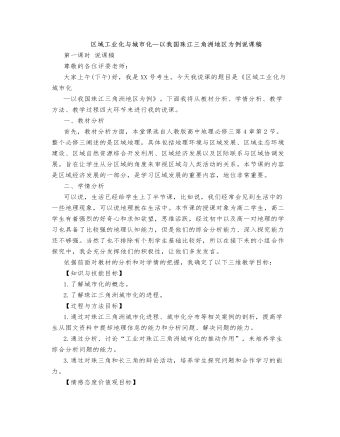
人教版高中地理必修3区域工业化与城市化—以我国珠江三角洲地区为例说课稿
A.城镇数量猛增B.城市规模不断扩大【设计意图】通过读图的对比分析,提高学生提取信息以及对比分析问题的能力,通过小组之间的讨论,培养合作能力。五、课堂小结和布置作业关于课堂小结,我打算让学生自己来总结,你这节课学到了什么。这样既可以提高学生的总结概括能力,也可以让我在第一时间内获得它们的学习反馈。(本节课主要学习了珠三角的位置和范围以及改革开放以来珠三角地区工业化和城市化的发展。)关于作业的布置,我打算采用分层次布置作业法。第一个层次的作业是基础作业,要求每一位同学都掌握,第二个层次的作业是弹性作业,学生可以根据自己的情况来选做。整个这堂课,老师只是作为一个引导者、组织者的角色,学生才是课堂上真正的主人,是自我意义的建构者和知识的生成者,被动的、复制式的课堂将离我们远去。

人教版高中地理必修3区域农业可持续发展—以我国东北地区为例说课稿
(3)师生讨论,提升思维深度。教师引领学生将讨论由农业生态破坏、土地利用不合理等表象问题逐步深入到农业结构不合理、农业技术落后等深层问题,提升了学生思维的深度。(4)角色体验,突破难点落实重点。在农民与保护区工作人员的角色体验活动中,学生们尝试换位思考,在冲突与交锋中,在教师的引领下,重新认识环境保护与区域经济发展的关系,在情感体验中加深对可持续发展内涵的理解,小冲突凸显大矛盾是本课设计的创新之处。2.注重对地理问题的探究,突出地理学科本质。地理学科具有综合性、区域性特征,区域差异及人地和谐发展观是我们在教学中应该把握的基本特征,也是我们应当把握的地理学科的本质特征,因此在本节课的设计中我注重抓住地理事物的空间特征、综合性特征,以突出地理学科的本质。
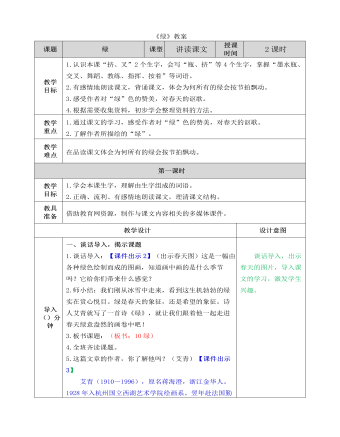
部编人教版四年级下册《绿》 教案
二、初读课文,整体感知1.自由地把课文朗读一遍。自学生字词语。2.检查生字词语:(1)读准字音。【出示课件4】墨水瓶、交叉、舞蹈、教练、指挥、按着节拍整齐集中墨绿嫩绿淡绿粉绿指名逐词读,指导学生读准字音。注意读准翘舌音“叉”,后鼻音“瓶”。(2)理解词义。学生分四人小组,交流一下不理解的词语。若是小组讨论无法解决的,提出来全班讨论。(3)重点指导:【出示课件5】交叉:方向不同的几条线或条状物互相穿过。节拍:是衡量节奏的单位,在音乐中,有一定强弱分别的一系列拍子在每隔一定时间重复出现。指挥:指导演奏的人。整齐:有秩序,协调一致。重叠:同样的东西层层堆叠,互相覆盖。(4)指导书写。大家读准了字音,了解了字义。请把要写的字在课堂本上每个字写一个,一定要看准每个字的笔画,端正、工整地把每一个字写好,注意写字的姿势。
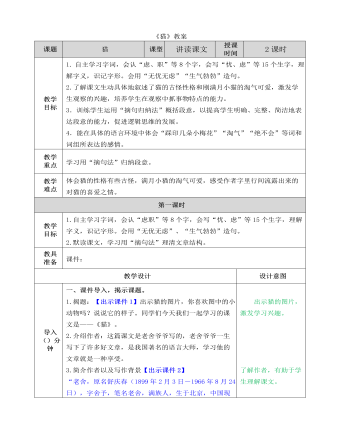
部编人教版四年级下册《猫》教案
三、总结全文,完成课后练习1.老舍笔下的猫你喜爱吗?为什么?老舍笔下的猫不像猫,倒像——(小孩子)。老舍把猫当作小孩子来写,用拟人化的手法写出了它的淘气、可爱,表达了对猫的喜爱之情。2.让我们有感情地朗读课文,把你的喜爱之情也表达出来。3.师述:你能学习课文的写法,围绕总起句写一段具体的话吗?【出示课件25】出示总起句(任选一题):(1)猫真老实。(2)猫很尽职。(3)课间活动丰富多彩。(4)这堂自习课真静啊!4.阅读链接【出示课件26】读读课后的阅读链接,体会不同作家对猫的喜爱之情。同样写猫,有什么不同?预设:夏丐尊写对猫的喜爱,用了衬托的方法,从妻子孩子对猫的喜爱,表达自身的喜爱之情。
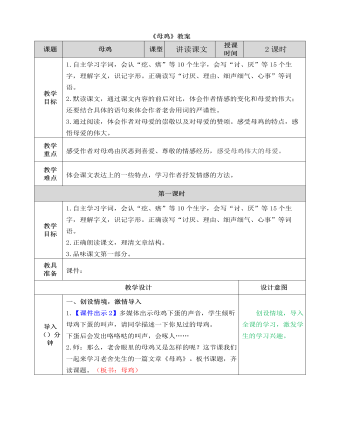
部编人教版四年级下册《母鸡》教案
一、复习检查,导入新课【出示课件12】1.检查字词出示生字卡片:疙瘩侮辱聋子啄一啄伏地凄惨忠厚毒手歪头掘地讨厌理由细声细气心事田坝反抗可恶成绩心思警戒预备汤圆啼叫疙瘩汤圆2.谈话导入新课:上节课我们学习了课文的第一部分,认识了无病呻吟、欺软怕硬、爱炫耀的母鸡,这节课,我们将继续跟随老舍先生了解一下第二部分,又介绍了母鸡的什么特点?二、自主探究,深入学文1.什么原因使作者改变了看法?在文中找到能概括说明这一原因的句子,画下来。三、根据学生的回答出示:【出示课件13】它负责、慈爱、勇敢、辛苦,因为它有了一群鸡雏。它伟大,因为它是鸡母亲。一个母亲必定就是一位英雄。